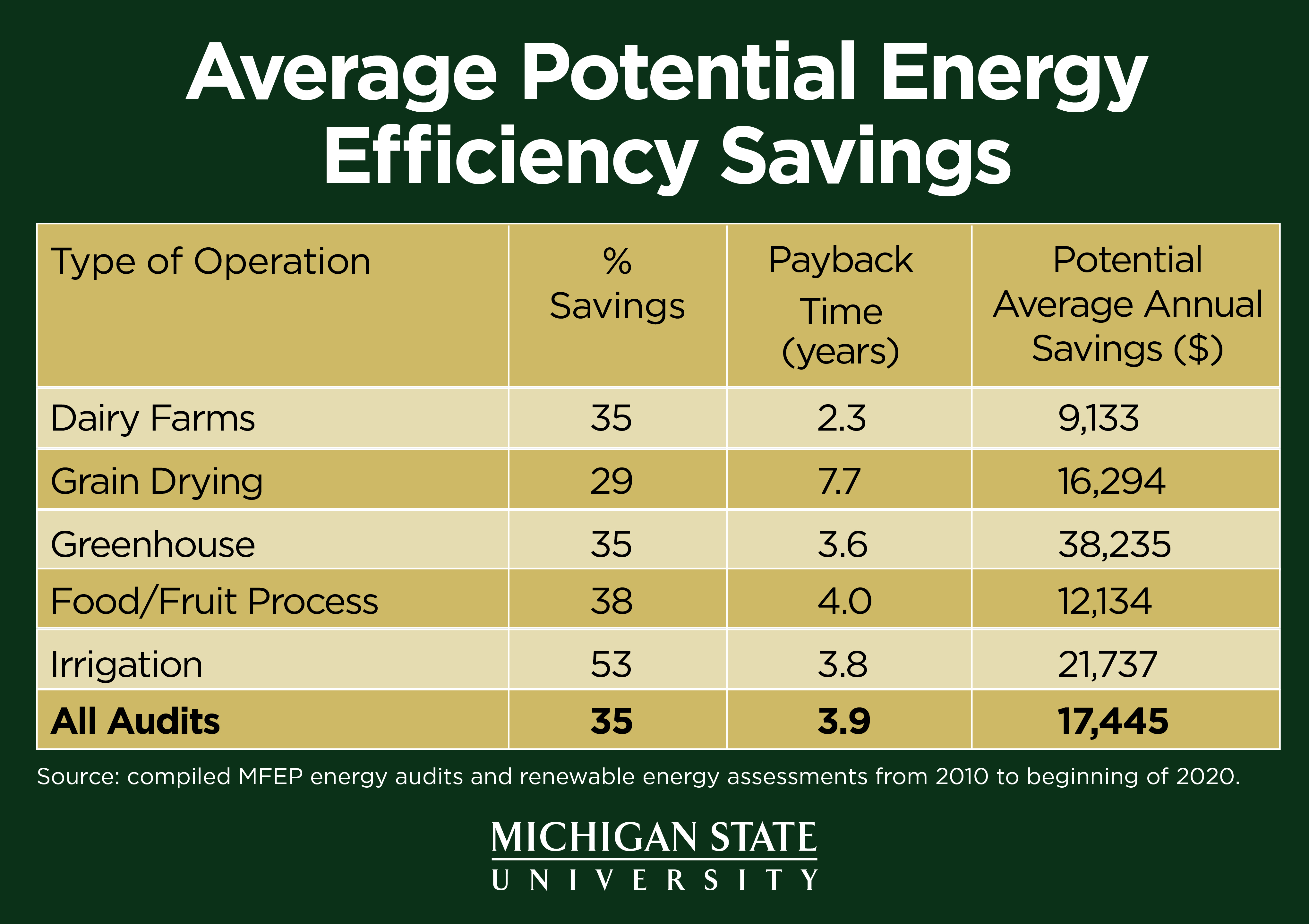MSU programs help farmers increase energy efficiency, reduce costs
The Michigan Agricultural Electric Council and its Michigan Farm Energy Program help farmers solve energy-related issues and save money.
Farming can be an expensive business — and energy consumption can be one of the more costly attributes of running a farm.

Aluel Go, faculty member and specialist in the Michigan State University (MSU) Department of Biosystems and Agricultural Engineering (BAE), and MSU Extension energy outreach educator, and Truman Surbrook, BAE professor and Michigan Agricultural Electric Council (MAEC) executive secretary, work together to help Michigan farmers keep energy costs down.
Go is the manager of MAEC’s Michigan Farm Energy Program (MFEP), an MSU program that trains qualified farm energy auditors, offers energy audits and provides technical assistance to farmers at little to no cost. The program also provides renewable energy assessments.
Energy audits are thorough assessments of a farm’s energy usage to determine areas with the most potential for reducing costs and improving efficiency and energy management.
“Farmers used to view energy as a needed and essential expense and they just paid for it, but the potential savings in farms are quite significant,” Go said. “I consider farms the low-hanging fruit for energy efficiency. They have been exempted from many building and electrical codes, so all the inherent energy efficiencies that were built into these codes are pretty much missing on the farms.”
During an energy audit, a farmer and auditor will review together the farmer’s last three years of energy bills. The farmer will also give the auditor a tour of their operation and explain their management strategies and how they use their equipment (age, frequency and duration of use, technical specifications, etc.).
“Farmers know their farms. They know every piece of equipment. They know every operational aspect of the farm like the back of their hand,” Go said. “We are there to learn what they're doing and help them improve, but not tell them how to do things.”
Funding energy-efficient farms
Certified energy audits are usually required of farmers applying for energy efficiency grants from the U.S. Department of Agriculture Rural Energy for America Program (USDA REAP). Audits are also used in rebate applications to utilities and state-run energy efficiency and utility waste reduction funding programs.
Funding from REAP and other programs helps farmers implement energy efficiency or renewable energy projects. REAP grants and contributions from Michigan utilities cover the costs of MFEP energy audits.
“Auditors can help farmers put together the paperwork to apply for grants,” Surbrook said. “The auditor is in a unique position to provide the technical requirements of the application and have been trained to develop such grant applications”
From 2002-2009, Michigan ranked in the bottom among U.S. states for approved USDA-REAP energy efficiency projects for farms and rural businesses. In 2011, two years after the MFEP started, Michigan ranked fifth. The state has continued to rank in the top ten in energy efficiency over the last decade.
“We are proud of the work we’ve done to help Michigan farmers adopt energy efficient practices,” Go said.
Education and outreach
To implement energy audit programs for Michigan farmers, it was critical for Go to work with utilities companies to improve knowledge of agricultural energy consumption. Utility customers are categorized as commercial, industrial, and residential. Agriculture mostly falls in the residential category, which can result in misconceptions about energy usage.

“We had to educate the utilities: 'Look, even though farmers are classified as residential customers, they need more than just a furnace, efficient hot water, efficient air conditioning,' which pretty much is what residential customers are limited to,” Go said. “The amount of equipment a farmer uses is closer to commercial or industrial customers.”
Energy efficiency rebates and qualified measures from utilities, which encompass energy efficiency modifications, methods, replacements, and upgrades, would also vary drastically from one utility company to another. This resulted in skepticism from farmers, according to Go.
“I worked with the utilities and we kind of condensed them to have a coordinated energy program for farmers — have the same payments, same requirements and so forth,” Go said. “Now, pretty much all the major utilities companies have similar energy measures and payments for agriculture.”
Go partners with MSU Extension to help farmers put cost-saving energy matters into practice.
With the guidance of Surbrook and MAEC, which provides information and educational resources for Michigan agriculturalists, Go has developed pilot sites to answer questions about the cost and maintenance of energy efficiency improvements and solar energy panels. This project has also received funding from the Michigan Office of Climate and Energy.
“All the calculations and presentations are useless if they don't get implemented,” Go said. “That’s where MSU Extension, MAEC and other partners are important.”
Collaborating to address voltage issues
As the executive secretary for the MAEC, Surbrook brings utility, agricultural and government organizations together to solve energy-related problems.
“What it does is it takes the agricultural organizations, MSU and the utilities that are serving natural gas and electricity to farm customers, and periodically brings them together,” he said. “We meet probably two or three times a year. If there's any issue that's coming up, it gets dealt with at that point. So, it solves issues before they become problems.”
Organizations involved with the MAEC include: MSU Extension, Michigan Farm Bureau, the Michigan Milk Producers Association, Michigan Department of Agriculture and Rural Development, Michigan Office of Climate and Energy, Michigan Public Service Commission and Michigan utility companies, including Consumers Energy, DTE Energy and electric cooperatives.
The MAEC worked together to address stray voltage, also called neutral-to-earth voltage, which can cause small electrical charges that livestock can feel, but humans generally can’t.
“A voltage can develop on almost anything that can be touched. In wet conditions, these stray voltages can cause the animals to get agitated,” Surbrook said. “For example, dairy cows would get a shock every time they put their muzzle into a watering device, so they wouldn’t drink as much water and therefore, not give milk.”
He said stray voltage will never go away, but there are ways to keep the issue under control. In fact, the MAEC helped the State of Michigan draft a law that mandates utility companies help agricultural producers investigate stray voltage issues at no cost.
“The State of Michigan passed a law that says that electric utilities have to have personnel available that an agriculture producer can call to check on a voltage issue at no charge,” Surbrook said.
Helping farmers help farmers
Surbrook said MSU’s commitment to helping farmers improve their energy practices speaks to the university’s credibility.
“As experts at a state university, agricultural producers look up to us to be the source to answer their questions,” he said. “That's a big responsibility. And we have to work hard — all of us — to maintain that.”
While some farmers were initially skeptical of energy audits, Go and Surbrook said many now encourage others to get them.
“We can stand up and tell the farmers something, but it means a whole lot more when we get an excited farmer talking to farmers,” Go said. “One of our bottom lines is that energy efficiency is absolutely necessary to be able to help them control their costs. It's getting pretty tough for them to stay in the black. Energy efficiency has been an area where we can help.”



 Print
Print Email
Email



